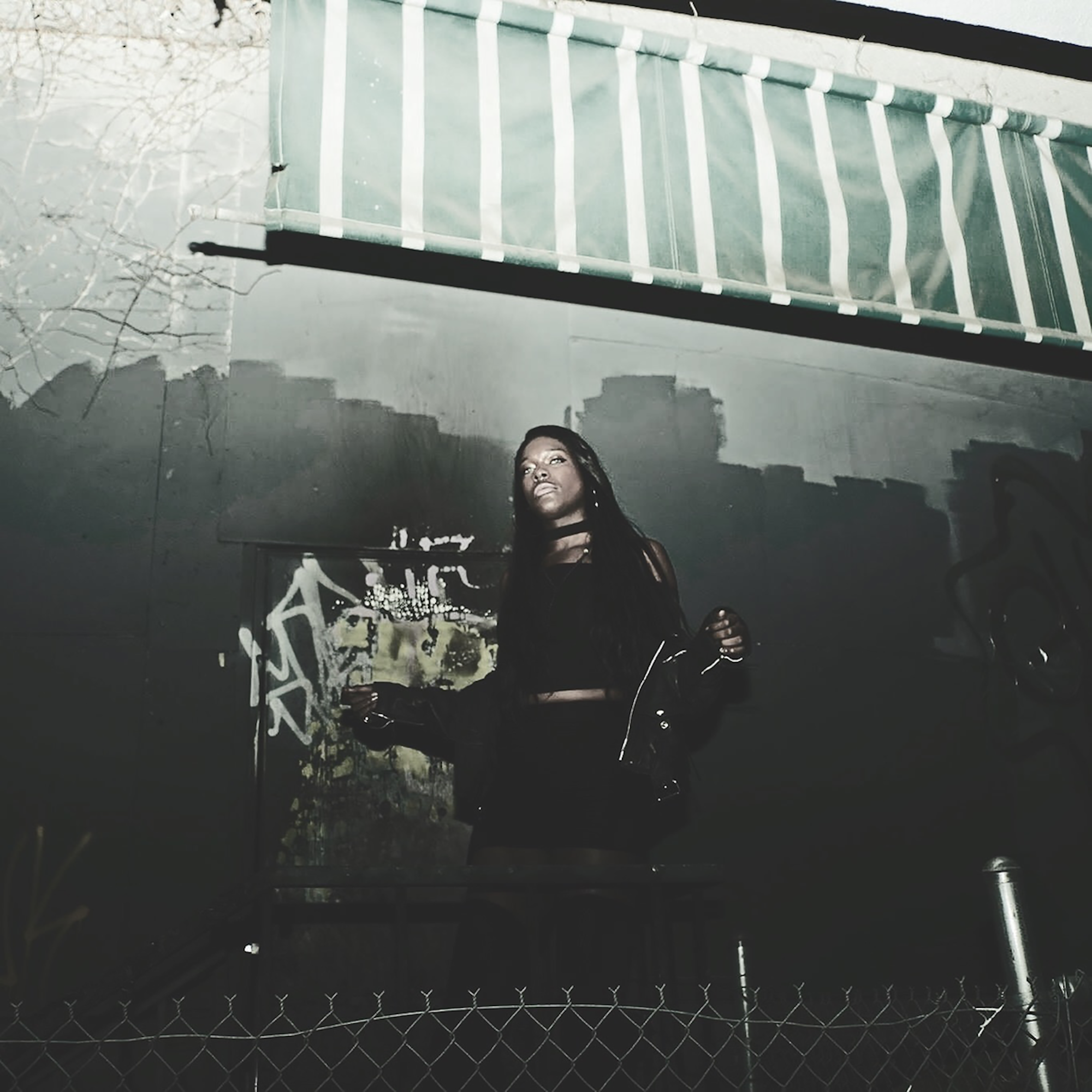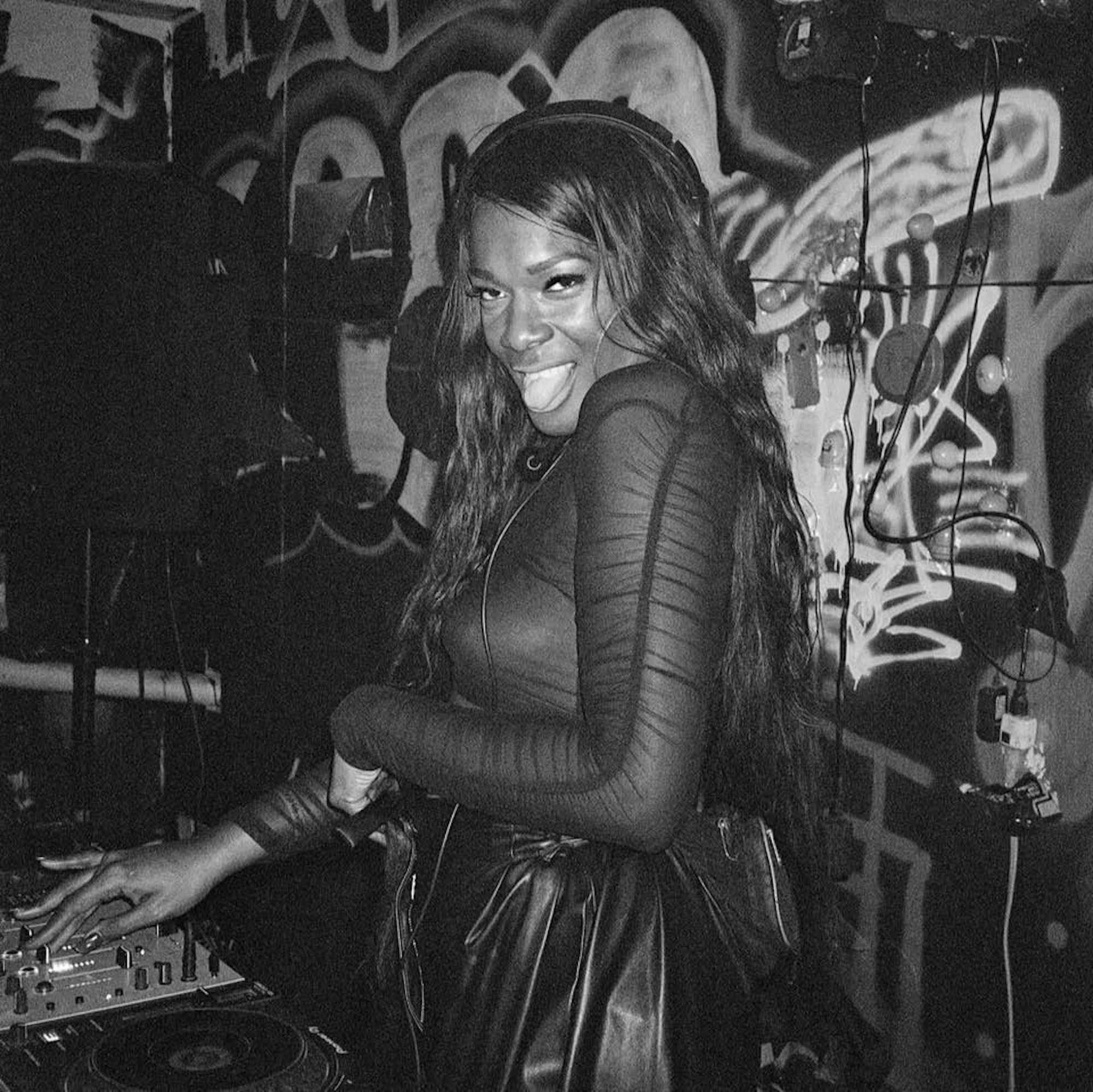If you already live in hell, why not embrace it and make music that sounds like it belongs on an infernal dance floor? That was the approach New York DJ and producer Jasmine Infiniti took with her debut album BXTCH SLÄP, combining throbbing techno beats, ambient house and subterranean sci-fi samples (the opening track “BXTCH SLAP: Queen Of Hell” samples Galadriel in The Lord of the Rings) into deliciously dark, apocalyptic rave music.
“As a black trans woman, often just existing in this world feels hellish,” Infiniti told i-D last week from her home in Brooklyn. “It’s about embracing that hell vibe… taking hell and having fun with it.”
Those who frequent queer night spots in New York will know Infiniti as a genre-bending DJ who blends hip-hop, ballroom, house and techno beats into the wee small hours. However on the opposite coast in Oakland, Infiniti is also known as the former East Bay Infiniti House mother — she led the offshoot of the New York vogue house — and for starting the New World Dysorder dance party. It’s because of the party that Infiniti learned to DJ, and with the support of other NWD members and Club Chai’s Esra Canoğullari (8ULENTINA), she got behind the decks for the first time. “Esra was one of the first people to give me access to practice on CDJs and to give me a different perspective. They taught me that I didn’t have to stick to one genre or one BPM, and that I could be free on the CDJs,” Infiniti explains. “That’s something I really appreciated learning and being validated in.”
“When I’m DJing, I’m really hoping to expand people’s minds when it comes to different genres of music, and really blow all that out of the water,” she says. BXTCH SLÄP benefits from that same fluid, free-range approach to production. Infiniti twists dark, punishing beats into sassy, sensual songs where every bass note lands like a cruise missile. Her main purpose is to make you move, because without that symbiosis, the music has little reason to flourish.
Following the release of her debut album, i-D spoke to the New York DJ about growing up in the Bronx, being crowned the Queen of Hell and how the ballroom scene informed her music taste.

You grew up in the Bronx. Can you give me a quick rundown of what family life was like and explain how it foreshadowed your preoccupation with electronic dance music?
Music has always been a part of my familial life. My mom was a Ford model and was really connected to the creative world. She did a lot of stuff with people who were involved in the ballroom scene and I would be babysat by some of her model friends, who I later realized were in Paris is Burning. My sister’s father was also one of the later members of Grandmaster Flash and the Furious Five, so growing up I had all these connections to music. I went to the Boys & Girls club in the Bronx and I had a little band, we were called Black Rain and we wrote a song and performed it. I’ve always been involved in music — performing, singing, dancing; I even did choreography when I was growing up — so it is definitely deeply ingrained in me. Then, when I was 18 or 19, I discovered the ballroom scene and that became my life. Being involved in that, meeting other trans people, other queer people of color and learning about music from that perspective was super formative for my career as a DJ and producer.
Your name comes from your association with the House of Infiniti. Can you explain how you came to be involved and lived at that particular house?
One of the first houses that took me in and took my interests seriously was this kind of kiki house called the House Of Shade. We never really participated in ballroom that much, but it was my first house. Then through that house father I became friends with a couple of people who were in different houses, including the House of Angel, and then I moved on to the House of Infiniti, which I was brought into by my gay mother, Denise Infiniti. She brought me into that house and saw me for drag face [category] at the time. Then I started officially transitioning. I walked, I think twice for face, and got chopped both times, and I quickly realized the ballroom scene was really hard and kind of judgemental, and that wasn’t something that I wanted to do. Especially after having transitioned, I wasn’t super excited about people judging my level of femininity. What had always drawn me to the ballroom scene were voguing and the music, those were the things I wanted to do, but after transitioning those weren’t things people wanted me to participate in, so I started to shy away from the ballroom scene.
Then when I was living in the East Bay, people wanted me, as a native New Yorker, to bring that to California. So that’s when I became the mother of the house in California with the blessing of the mother here in New York, who is the overall mother. I saw that as an opportunity to build a scene or influence a scene that was already in California, to be a little more inclusive or different to the New York scene.
Ballroom music vibrates in a very specific way. Can you describe it?
I took this class when I was in college called ‘Music of the World’ and one of our thesis papers was to write about how music and music genres are culturally created. It was all I could think about, especially after having just seen Paris Is Burning for the first time and already being involved in the ballroom scene. So I did my paper on it, talking about bitch beats and where bitch beats came from, this idea of queer music and queer artists. Bitch beats were basically when people took a techno or a house track and put shady vocals on top of it, like Kevin Aviance’s “Cunty” or “Miss Honey” by Moi Renee. Even “The Ha Dance,” I’m not sure if Masters At Work are gay or queer, but I know that that track in general was the blueprint for what is now considered ballroom beats. Having the crash — the boo bwele boo bwele boo bwele ah ha!’ — syncopated with the dance movements is how music culturally is created; it’s coupled with a dance, it has the call and response aspect to it. It’s not a ballroom beat unless it’s coupled with a dance. I’m not sure if I, at least not purposefully, put that into my music, but I do feel like it can come out that way. But I also feel like one can vogue to anything if you really know how to.
It’s interesting that you say it’s not something you purposefully put into your music, because in the first track on your album you sample the word “queen” on the fourth or fifth beat, just like how Masters At Work sample Eddie Murphy in “The Ha Dance.”
It wasn’t conscious, but like you said, it’s in my DNA so it’s subconsciously been there for a while. I can definitely feel that, but I didn’t know if other people actually noticed it. I hadn’t even noticed that the word “queen” does that.
You have the nickname The Queen of Hell. How did you get that?
It actually came from my friend Darrin, who was one of our first DJs [at New World Dysorder]. He had a friend named Supa Skank, who is this rapper from the Bay, and they had this book that they had planned on writing called The Queen of Hell. It was apparently about this woman who is abducted by the devil in the future, and the devil has this spaceship that is powered by a black hole. All of the women on the ship are sex slaves and are forced to put on sex shows every fifteen minutes or something. One time, I had tried DMT and I had this crazy vision that was basically that [same idea]. I hadn’t heard of this story, but I was telling my friend about it and he was like, that’s like my friend’s book The Queen of Hell. So, my friend Darrin gave me that nickname. There was an article that said it was self-proclaimed, but I have never proclaimed myself as such. I was literally crowned The Queen of Hell.
You’ve stated that BXTCH SLÄP is as much about myth-building as it is about claiming space as a queer person. Can you explain what this album means to you within that context?
It’s building on that myth of being The Queen of Hell and how as a black trans woman, often just existing in this world feels hellish. The things that I have personally had to go through and that many other black trans women endure, it’s almost as if we are existing in hell already. It’s kind of like, well if I’m already here, I might as well live it up and find the best parts of this existence that I can. It’s about embracing that hell vibe. If I’m already here then I’m gonna be debaucherous and party to all hours of the morning. I want it to reflect that, but also have a little bit of sadness, a little bit resentfulness and a little bit anger, but also happiness and joy. It’s about taking hell and having fun with it.
What has been the most gratifying part of putting this project together?
Just having had the opportunity to put it together has been amazing, knowing that a lot of black trans women out there have visions and have the desire to create, and oftentimes are doing it and not getting recognition for it. I’m really honored to be able to create something and have people see it and respect it. I’m also really grateful for having made the connections I have by just throwing a party and starting all this stuff, because I may not have all the money in the world but I have social clout, and that’s worth something. I have been able to take that and use it, not just to my benefit but to the benefit of everyone who has been a part of New World Dysorder. I’m just amazed that I’ve been able to do that for people as a black trans woman.
